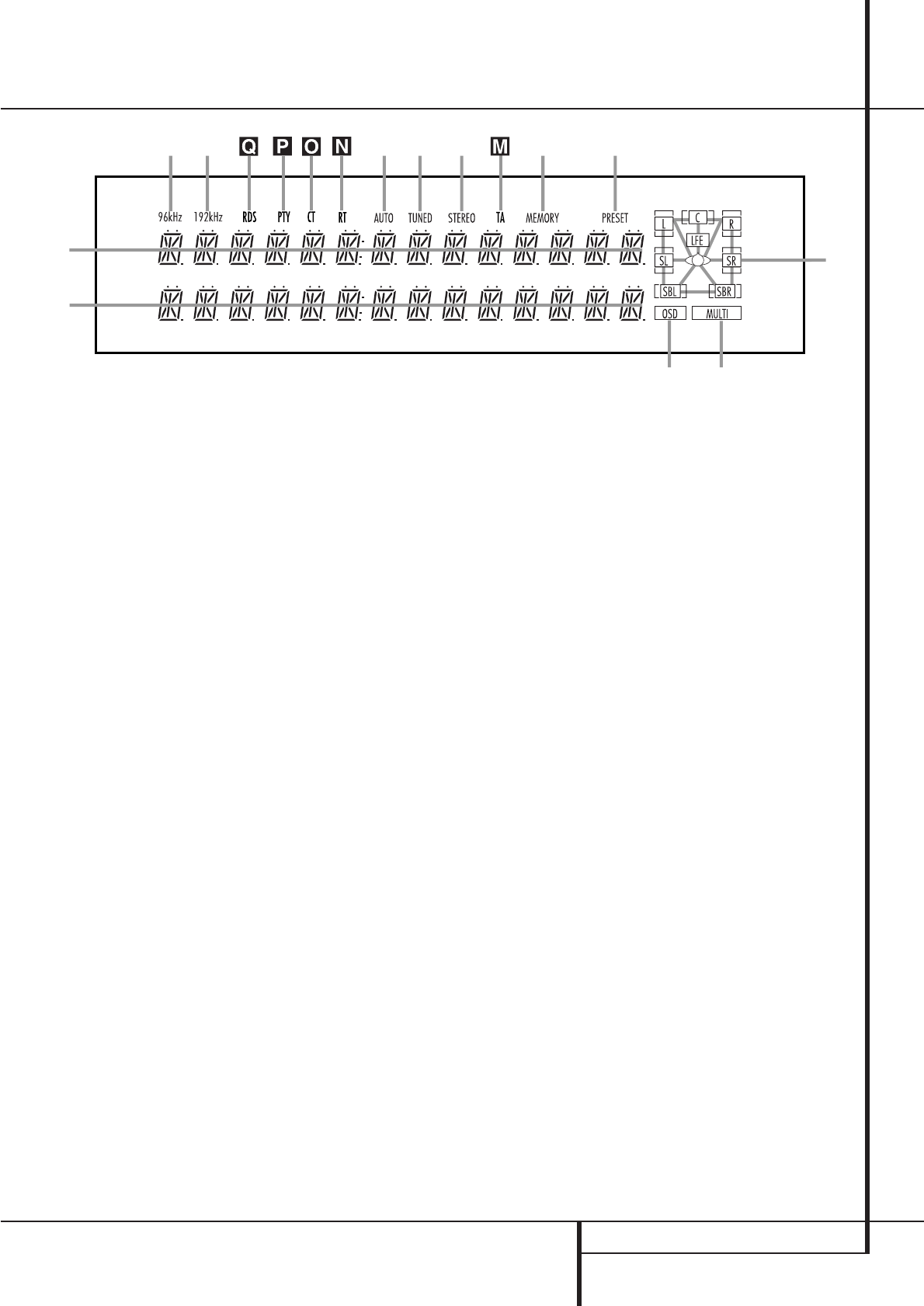
A
B
C
D
E
F
G
H
I
J
K
L
M
N
O
P
Q
FRONT PANEL INFORMATION DISPLAY 7
Front Panel Information Display
A
B
D
E
K
L
F
H
I
J
C
G
Upper Display Line
Lower Display Line
OSD Indicator
Multi Indicator
Speaker/Channel Input Indicator
Preset Indicator
Memory Indicator
Stereo Indicator
Tuned Indicator
Auto Indicator
192 kHz Indicator
96 kHz Indicator
Traffic Indicator
Radiotext Indicator
Clock Time Indicator
Program Type Indicator
RDS Indicator
A
Upper Display Line: Depending on the
unit's status, a variety of messages will appear
here. In normal operation,the current input
source name will appear on this line.
B
Lower Display Line: Depending on the
unit's status, a variety of messages will appear
here. In normal operation,the current surround
mode name will appear on this line.
C
OSD Indicator:When the OSD system is in
use, this indicator lights to remind you that the
other indicators in this display do not function
when the On Screen Display is being used.
D
Multiroom Indicator:This indicator lights
when the multiroom system is active. Note that it
will remain lit when the multiroom system is in
use even though the main room system is in the
Standby mode and all other indicators are dark.
(See page 41 for more information on the
Multiroom system.)
E
Speaker/Channel Input Indicators:These
indicators are multipurpose, indicating either the
speaker type selected for each channel or the
incoming data-signal configuration.The left,cen-
ter,right,right surround, left surround, right back
surround and left back surround speaker indica-
tors are composed of three boxes, while the sub-
woofer is a single box.The center box lights when
a “Small” speaker is selected, and the two outer
boxes light when “Large” speakers are selected.
When none of the boxes are lit for the center,sur-
round or subwoofer channels, no speaker has
been selected for that position.(See page 22 for
more information on configuring speakers.) The
letters inside each of the center boxes display
active input channels. For standard analog inputs,
only the L and R will light,indicating a stereo
input.When a digital source is playing,the indica-
tors will light to display the channels begin
received at the digital input.When the letters
flash, the digital input has been interrupted.(See
pages 24 and 36 for more information on the
Channel Indicators).
F
Preset Indicator:This indicator lights when
the tuner is in use to show that the present num-
ber for the current station being listened to
appears in the Upper Display Line. (See page 42
for more information on tuner presets.)
G
Memory Indicator:This indicator flashes
when entering presets and other information into
the tuner’s memory.
H Stereo Indicator:This indicator illuminates
when an FM station is being tuned in stereo.
I
Tuned Indicator:This indicator illuminates
when a station is being received with sufficient sig-
nal strength to provide acceptable listening quality.
J Auto Indicator:This indicator illuminates
when the tuner’s Auto mode is in use.
K 192 kHz Indicator: This indicator lights
when the input source has a 192 kHz bit rate.
L 96 kHz Indicator: This indicator lights when
the input source has a 96 kHz bit rate.
M
TA Traffic Announcement Indicator: This
indicator illuminates if the RDS station tuned
somtimes transmits traffic information (see page
43 for more information on RDS).
N
RT Text Indicator:This indicator illuminates
when the RDS station tuned is transmitting
radiotext (RT) data.
O
Clock Time Indicator:This indicator illumi-
nates when the RDS station tuned is transmitting
the CT (clock time) code, indicating the current
time of day.
P
PTY Indicator:This indicator illuminates
when the RDS station tuned is transmitting pro-
gram type data,or during a PTY search.
Q
RDS Indicator:This indicator illuminates
when the station tuned is transmitting RDS data.


















